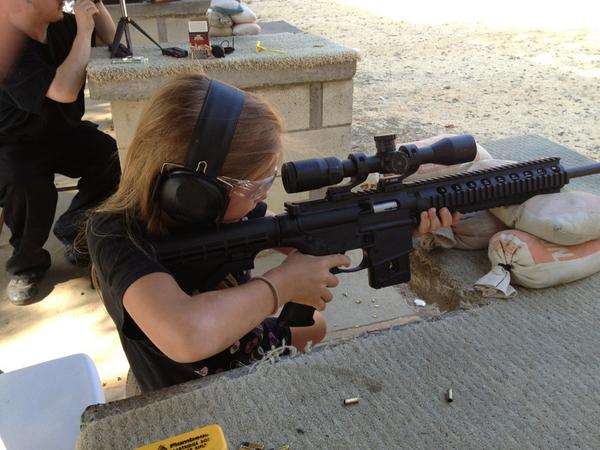Steven_R
Tommy Vercetti Fan Club
- Jul 17, 2013
- 4,852
- 930
- 245
Current interpretation of "The right to bear arms shall not be infringed" and why Heller Vs. was a bad decision
The Second Amendment is simple and clear, and we don't need lawyers, judges, or politicians to explain it to us.
Many "conservatives" are happy with the 2008 Supreme Court ruling of D.C. vs. Heller, and although the ruling could have been worse (illegally), the truth is the ruling wasn't very good, and here's why,
let's start with a little history...
Originally, James Madison wanted the Federal courts to have judicial review over states but this idea was rejected by early Americans who were afraid the Federal government would become too powerful (like today). The Federal government didn't have the authority or ability to march into states and tell everyone what to do. That being said, the states still had full respect for Federal law. Supreme Court Justice John Marshall, who was one of the last Federalist in office because he couldn't be thrown out, spent most of his time driving wedges in a law, so he could win power for the Supreme Court, ...in his conspiracy, he declared that the Supreme Court was powerless against the states.
Eventually the Federals became influential in government once again, they declared that they needed to "fix" America by raising an army and throwing soldiers at the Southern states until they took the place over. At that point America stopped being a group of united states, and became a nation ruled by a federal cartel. According to their own words, they needed to "enforce the Bill of Rights to the states".
If the Federals were telling the truth, and we hold them to their own words , "Enforce the Bill of Rights to the states", according to the Second Amendment, it is now the job of the Federal government and the Supreme Court to overturn any state law that prohibits gun ownership , or carrying guns in public places.
but that's not what we saw, in D.C. vs. Heller, the Supreme Court ruled that states have the power to ignore the Second Amendment, and 4 out of 5 justices don't recognize the Bill of Rights at all, which will be a set-up in the future for ignoring the Second Amendment completely.
_____________________________________________________________
--------------------------------------------------------------------------------------------
_____________________________________________________________
No regard for the Second Amendment at all.
Let's examine the treasonous dissenting opinions on the Supreme Court.
>>>>>>>>>>>>>>>>>>>>>>>>>>>>>
Justice John Paul Stevens stated that the court's judgment was "a strained and unpersuasive reading" which overturned longstanding precedent, and that the court had "bestowed a dramatic upheaval in the law".[50] Stevens also stated that the amendment was notable for the "omission of any statement of purpose related to the right to use firearms for hunting or personal self-defense" which was present in the Declarations of Rights of Pennsylvania and Vermont
>>>>>>>>>>>>>>>>>>>>>.
John Paul Stevens propaganda says, American citizens don't have gun rights because rulings in the past limited gun ownership. He says the law is not correct because gun ownership isn't classified as for hunting , or keeping in the home. It doesn't limit the broad definition of "right to bear arms". (Limiting the definition makes it easier to overturn gun rights in the future)
>>>>>>>>>>>>>>>>>>>>>>>>>>>>>>>>>>>>
The Stevens dissent seems to rest on four main points of disagreement: that the Founders would have made the individual right aspect of the Second Amendment express if that was what was intended; that the "militia" preamble and exact phrase "to keep and bear arms" demands the conclusion that the Second Amendment touches on state militia service only; that many lower courts' later "collective-right" reading of the Miller decision constitutes stare decisis, which may only be overturned at great peril; and that the Court has not considered gun-control laws (e.g., the National Firearms Act) unconstitutional. The dissent concludes, "The Court would have us believe that over 200 years ago, the Framers made a choice to limit the tools available to elected officials wishing to regulate civilian uses of weapons.... I could not possibly conclude that the Framers made such a choice."
>>>>>>>>>>>>>>>>>>>>>>>>>>>>>>>>>>>>>>>>>
John Paul Stevens propaganda says, the founders didn't declare gun rights as an individual right. (even though they did "the right of the people") . He says that since the 2nd mentions "militia" , which has been replaced with a standing army, people can't have guns unless they are in the military, controlled by the government. He says that since the courts allowed gun laws in the past, they are legal. He says the founders would have never limited the powers of government. (This man knows absolutely nothing about our country)
>>>>>>>>>>>>>>>>>>>>>>>>>>>>>>>>>>>>.
Justice Stevens' dissent was joined by Justices David Souter, Ruth Bader Ginsburg, and Stephen Breyer.
>>>>>>>>>>>>>>>>>>>>>>>>>>>>>>>>>>>>>>
>>>>>>>>>>>>>>>>>>>>>>>>>>>>>>>>>>>>>>>>>>>>>>>>>.
Justice Breyer filed a separate dissenting opinion, joined by the same dissenting Justices, which sought to demonstrate that, starting from the premise of an individual-rights view, the District of Columbia's handgun ban and trigger lock requirement would nevertheless be permissible limitations on the right.
>>>>>>>>>>>>>>>>>>>>>>>>>>>>>>>>>>>>>>>>>>>>>>>>>
Justice Breyer propaganda says, there is no restriction on forcing people to use trigger locks. (which would have been unthinkable when the country was founded and a complete over-stepping of government law)
>>>>>>>>>>>>>>>>>>>>>>>>>>>>>>>>>>>>>>>>>>>>>>>>>>>>>>>>>.
The Breyer dissent looks to early municipal fire-safety laws that forbade the storage of gunpowder (and in Boston the carrying of loaded arms into certain buildings), and on nuisance laws providing fines or loss of firearm for imprudent usage, as demonstrating the Second Amendment has been understood to have no impact on the regulation of civilian firearms. The dissent argues the public safety necessity of gun-control laws, quoting that "guns were responsible for 69 deaths in this country each day.'"
>>>>>>>>>>>>>>>>>>>>>>>>>>>>>>>>>>>>>>>>>>>>>>>>>>>>>>>>>
Justice Breyer propaganda says, that since they found a case in Boston where gun power storage was restricted, and guns were not wanted in certain buildings, Americans have no gun rights. (and no history given with these examples). The paragraph finishes with a heart felt statistic urging people to abandon their right. (he also doesn't mention that police shootings are part of the statistic)
>>>>>>>>>>>>>>>>>>>>>>>>>>>>>>>>>>>>>>>>>>>>>>>>>>.
With these two supports, the Breyer dissent goes on to conclude, "there simply is no untouchable constitutional right guaranteed by the Second Amendment to keep loaded handguns in the house in crime-ridden urban areas." It proposes that firearms laws be reviewed by balancing the interests (i.e., "'interest-balancing' approach") of Second Amendment protections against the government's compelling interest of preventing crime.
>>>>>>>>>>>>>>>>>>>>>>>>>>>>>>>>>>>>>>>>>>>>>>>>>>>>>
Justice Breyer propaganda says, that a "crime ridden" area falls under different rules.( even though the Second Amendment makes no mention of that) He implies that law abiding gun ownership is somehow linked to crime, and there is no "untouchable" right. ("Shall not be infringed")
>>>>>>>>>>>>>>>>>>>>>>>>>>>>>>>>>>>>>>>>>>>>>>>>>>>>.
The Breyer dissent also objected to the "common use" distinction used by the majority to distinguish handguns from machineguns: "But what sense does this approach make? According to the majority’s reasoning, if Congress and the States lift restrictions on the possession and use of machineguns, and people buy machineguns to protect their homes, the Court will have to reverse course and find that the Second Amendment does, in fact, protect the individual self-defense-related right to possess a machine-gun...There is no basis for believing that the Framers intended such circular reasoning."[
>>>>>>>>>>>>>>>>>>>>>>>>>>>>>>>>>>>>>>>>>>>>>>>>>>>>>>>
Justice Breyer propaganda says, ...He tries to limit the definition of gun ownership to protecting the home. He tries to imply the founders would have never supported the ownership of machine guns. (Breyer seems to be unaware that it was perfectly legal to own cannons)
Even if all of that were true (and ignores McDonald v Chicago) the 14th Amendment specifically was written to make the Bill of Rights applicable to the states. Of course the Slaughterhouse Cases ignored that, but thankfully those were revisited a century later.






